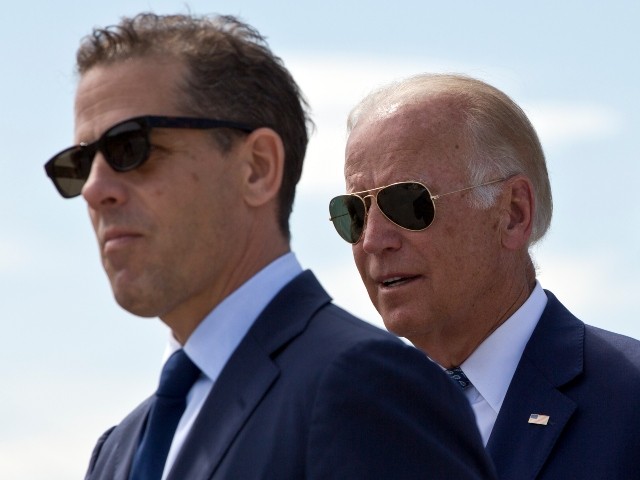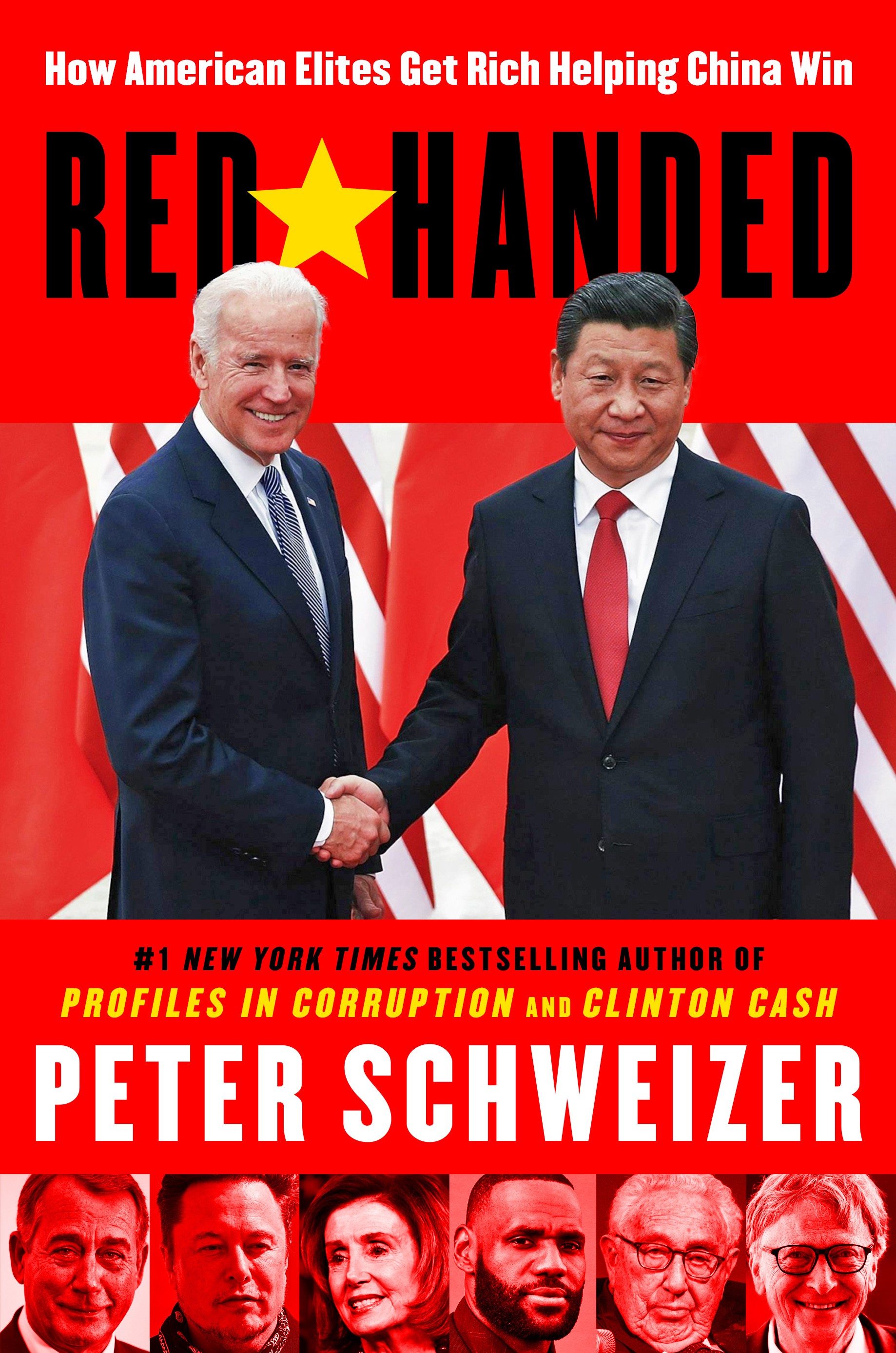The Biden family scored $31 million from five deals in China, all with individuals with direct ties to the Chinese spy apparatus, according to a bombshell new book.
Multiple financiers with direct ties to Chinese intelligence partnered with Hunter Biden during and after his father’s time as Vice President — including the former head of the Ministry of State Security and the head of foreign intelligence recruitment — and some of those relationships remain intact, according to Red-Handed: How American Elites Get Rich Helping China Win, by Breitbart News senior contributor Peter Schweizer.
Schweizer explains that Beijing saw a financial relationship with the Bidens as an opening for “elite capture,” which allowed Hunter Biden to secure meetings and score major deals with people in the highest levels of Chinese financial institutions and the Chinese Communist Party — and in return they would be able to leverage the Bidens’ power for their interests.
One of the central early players in the Bidens’ Chinese deals is a tycoon by the name of Che Feng, or “The Super Chairman,” as Hunter and his partners referred to him.
Che, the son of a PLA soldier, has been described in Western media as “a shadowy and discreet investor,” whose father-in-law was the governor of the People’s Bank of China, and whose business partner was the Vice Minister of State Security, a man by the name of Ma Jian. Schweizer writes that Ma was reportedly the director of the ministry’s No. 8 Bureau, overseeing North American operations targeting foreigners with its counterintelligence apparatus.
“The hazard of a Chinese businessman with close ties to the top ranks of Beijing’s spy agency conducting financial transactions with the son of the U.S. vice president cannot be overstated. How this did not set off national security or ethics alarm bells in Washington is a wonder in itself,” Schweizer writes in Red-Handed.
The Super Chairman was meant to “fuse Chinese financial might to those with access to the highest levels of power in the Western world,” which led to the creation of Bohai Harvest RST (BHR), “funded by China’s biggest government-backed financial institutions,” with the Biden scion and his American partners.
Another partner the Bidens were introduced to via “The Super Chairman” is Zhao Xuejun (aka Henry Zhao), who formed Harvest Fund Management. Zhao was the chairman and Chinese Communist Party general secretary at the firm.
Zhao had another company called “Harvest Global Investments,” which he co-founded with Jia Liqing, the daughter-in-law of a member of the Politburo Standing Committee at the time. Jia Chunwang, Liqing’s father, is the former minister of state security, “in charge of secret service, espionage, and domestic and overseas intelligence work.” That firm, Harvest Global Investments, wired $5 million to another Hunter Biden business called Burnham.
“There is no one more powerful in the world of Chinese intelligence,” Schweizer writes. “The seductive and lucrative deal that Hunter was now putting into place, creating BHR, involved two financiers with ties to the highest levels of Chinese intelligence, a billion-dollar private equity deal that we first exposed in Secret Empires. What we now know are the roles played by the spy-connected ‘Super Chairman’ and Zhao.”
“According to Michael Lin, another Chinese partner, Hunter’s role in the venture was pretty straightforward: ‘Open as many doors as possible in the western world for this very famous Bohai professional team.’ There was also the expectation that Hunter and his partners would ‘join some of the meetings in HK and China they arrange’ when communicating with possible financial partners,” Schweizer adds.
The Super Chairman and Ma Jian were eventually arrested and charged with money laundering and bribery, taking them out of the deal with Biden, however, the connections Hunter had made through them were already established, and Zhao would serve as a conduit for more deals ahead.
Eventually, BHR began buying or investing in companies in China and the U.S. with strategic importance.
For instance, Schweizer reports that one of their early investments was in China General Nuclear Power Corporation (CGN), with Hunter’s firm as an “anchor investor.” The FBI ultimately busted CGN as a “conduit for nuclear espionage in the West,” with CGN and a CGN engineer being charged by the Obama DOJ with stealing nuclear secrets in 2016.
BHR also bought an American company called Henniges Automotive, which created anti-vibration technologies with military and civilian applications. BHR partnered with the Aviation Industry Corporation of China to close the deal — one of China’s largest military contractors and a major culprit in the theft of U.S. defense technology.
Between the BHR deal and the $5 million wired by Harvest, Hunter received some $25 million from Chinese businessmen tied to the highest levels of Chinese intelligence, Schweizer writes.
Eventually, Hunter would be introduced to CEFC China Energy Chairman Ye Jiemaing (Jainming), with whom he would develop a close working relationship and would speak, according to Hunter, “on a regular basis.”
Hunter served as Ye’s “personal counsel,” and also worked with him to broaden CEFC as a global energy company with holdings in Oman, Romania, Colombia, and Luxembourg.
However, Ye also had close Chinese intelligence ties: “CEFC was housed in a complex in Shanghai’s French Concession section, an area ‘primarily controlled by China’s military.’ One of Ye’s early business partners was the granddaughter of ‘one of the founders of China’s military,’ Marshal Ye Jianying.”
“The corporate logo of the company Hunter Biden was now advising, and which would pay him millions, features a star. According to company records on its English website, it represents ‘civil rights.’ However, on the company’s Chinese-language site, the star signifies that ‘this organization will play a strong and powerful role for the interests of the Chinese state and nation,’” Schweizer writes.
CEFC was also a direct beneficiary to the Chinese military, as the company played a central role in China’s Belt and Road Initiative, and was an oil supplier to the People’s Liberation Army.
Hunter would set up two entities with Ye, Hudson West IV and SinoHawk, to allow the Chairman to invest in U.S. infrastructure. In total, the Biden family received some $6 million from Ye’s companies.
The following photo retrieved from Hunter Biden’s hard drive shows a flow chart describing the ownership breakdown of Hudson West.
It was in a deal with CEFC that Hunter reportedly discussed holding 10 percent for the “big guy,” Joe Biden.
In working with Ye, Hunter Biden also built a relationship with the Chairman’s “emissary,” Gongwen Dong, with whom he had plans to share an office, along with Joe and Jill Biden following the then-VP’s departure from office.
But Dong was not only an “emissary” for the Chairman — at the time he was also the chief financial officer for Beijing-based Radiance Property Holdings, controlled by Lam Ting Keung, a businessman with deep connections to “united front” groups linked to Chinese intelligence and a member of the Chinese People’s Political Consultative Conference, a central component of the CCP’s united front efforts, which often serve as covers for Chinese intelligence operations.
“In sum, each deal the Bidens secured in China was via a businessman with deep ties at the highest levels of Chinese intelligence. And in each case there appears to be little discernible business or professional service that was rendered in return for the money,” Schweizer writes.
There is evidence previously reported by the New York Post that the Biden family business was footing bills for Joe Biden’s expenses — as Schweizer writes in the book, “Hunter Biden and Joe Biden blurred their funds.”
In the infamous “Laptop From Hell,” a 2019 text was recovered from Hunter Biden to his daughter Naomi, where he writes, “I hope you all can do what I did and pay for everything for this entire family for 30 years … It’s really hard. But don’t worry, unlike Pop, I won’t make you give me half your salary.”
Hunter Biden holds hands with President-elect Joe Biden in Wilmington, Delaware, on November 7, 2020, after Biden was declared the winner of the presidential election. (JIM WATSON/AFP via Getty Images)
There is also an email to Hunter on the hard drive from 2010, subject line: JRB bills, where bills are detailed for contractors hired for upkeep on the senior Biden’s Wilmington house, for Hunter to pay.
“The bills that June included $2,600 to contractor Earle Downing for a ‘stone retaining wall’ at Joe’s Wilmington estate, $1,475 to painter Ronald Peacock to paint the ‘back wall and columns’ of the house, and $1,239 to builder Mike Christopher for repairs to the air conditioning at the cottage of Joe’s late mother, Jean ‘Mom-Mom’ Biden, which was on his property and which he would later rent to the Secret Service for $2,200 a month,” The Post reported.
Peter Schweizer also reveals in Red-Handed that Rosemont Seneca, another one of Hunter’s many entities, set up separate phone lines to reach then-VP Biden, and paid for that monthly bill — a move Schweizer calls “not legal.”
“Beijing should certainly be happy with the overall posture of the Biden administration. The talk is tougher, but the main tenets of the foreign policy that Beijing wants Washington to pursue are secure: no radical reduction in the transfer of technology or capital from America to Beijing, no fundamental challenges to the Chinese regime, and mild criticisms over human rights accompanied by excuses for their conduct,” Schweizer writes.
Red-Handed, published by Harper-Collins, will be released on January 25. Schweizer is the president of the nonpartisan Government Accountability Institute (GAI) and a senior contributor to Breitbart News.
Emma-Jo Morris is the Politics Editor at Breitbart News. Email her at ejmorris@breitbart.com or follow her on Twitter.

